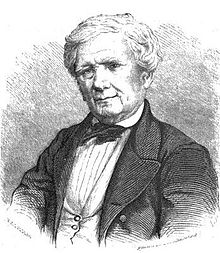Jean Reboul
Jean Reboul (born January 23, 1796 in Nîmes , † May 28, 1864 ibid) was a French poet and politician .
Life
Jean Reboul was the son of a locksmith and learned the bakery trade. After receiving news of Napoleon's return from Elba (March 1815), he joined the army of royal volunteers. He later devoted himself to lyrical poetry in his leisure hours and in 1828 published the graceful elegiac poem L'ange et l'enfant . It was through this work that he drew the attention of Alphonse de Lamartine , who made him famous with his poem Le génie dans l'obscurité .
Reboul's first and best collection of poems, Poésies, with a preface by Alexandre Dumas and a letter from Lamartine appeared in 1836 and had five editions. In addition to L'ange et l'enfant , this collection also contains several beautiful pieces such as L'aumône au Christ , La lampe , Un soir d'hiver and others. a., in the gently elegiac tone that Lamartine had struck in the meditations. The same Catholic sentimental tendency emerges in his other poems.
In 1839 Reboul came to Paris and published the biblical poem Le dernier jour (1840). Then he wrote three tragedies , one of which, Le martyre de Vivia , was performed in 1850 in the Odéon in Paris. He also edited Poésies nouvelles (Paris 1846) and Les traditionalelles (1857).
After the February Revolution of 1848 , Reboul was elected to the Constituent Assembly by the Gard department in April 1848 , where he voted with the Legitimists. He died on May 28, 1864 at the age of 68 in Nîmes. After his death his Dernières poèsies appeared (Paris 1865).
literature
- Jean Reboul . In: Meyers Konversations-Lexikon . 4th edition. Volume 13, Verlag des Bibliographisches Institut, Leipzig / Vienna 1885–1892, p. 623.
Web links
- Jean Reboul on the website of the Assemblée française (French)
| personal data | |
|---|---|
| SURNAME | Reboul, Jean |
| BRIEF DESCRIPTION | French poet and politician |
| DATE OF BIRTH | January 23, 1796 |
| PLACE OF BIRTH | Nîmes |
| DATE OF DEATH | May 28, 1864 |
| Place of death | Nîmes |
